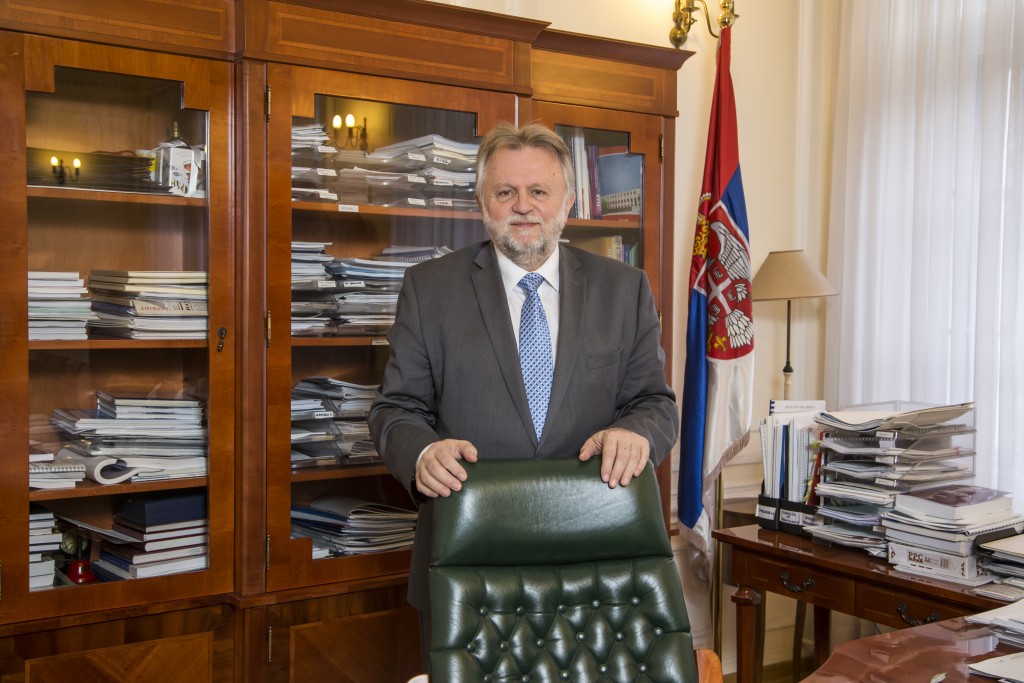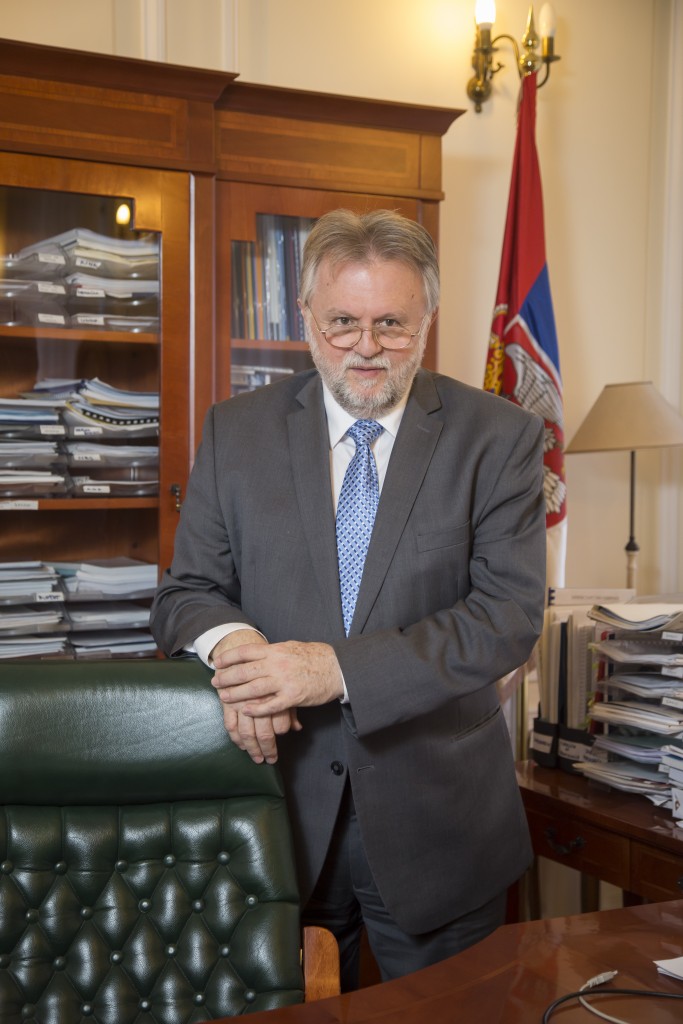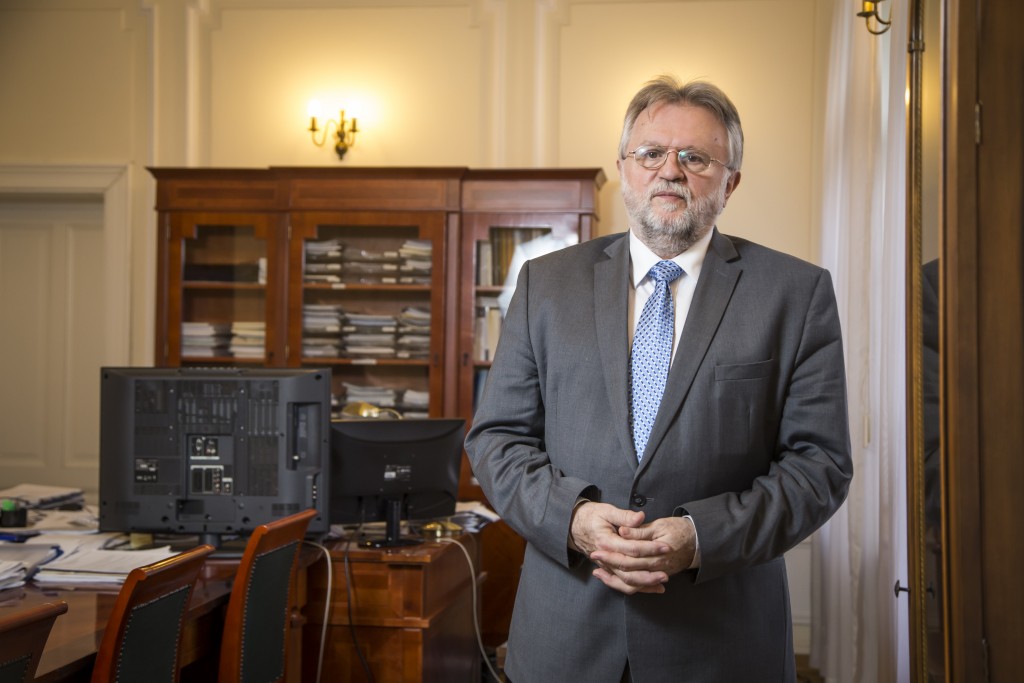We have reached a juncture in the reform process where we have to settle “past due bills” of deferred reforms and overcome the legacy of the past, once and for all. The strong resistance we have encountered recently can only be overcome through renewed political and social support obtained in the forthcoming elections and the creation of a new drive for a modern European economy.
For Serbian Finance Minister Dušan Vujović, the key result of the parliamentary elections will be the mandate from the voters on whether to maintain status quo and further procrastinate change, or face the truth a boldly embark on structural reforms that will pave the way to an efficient economy ready to compete at home, in European and global markets.
“I think that during the past two years we have achieved significant fiscal and macro-monetary results recognised in Europe and worldwide. To sustain these results we must resolve structural problems in state owned companies, public administration and the financial sector, and for this we need strong and explicit support of the voters,” says Minister Vujović.
As minister of finance, what do you see as potentially the biggest gains and losses of the upcoming elections?
The biggest gain would be confirmed validity of the 2014 reforms. From the very beginning we knew in detail what needs to be done in the areas of fiscal consolidation and other macroeconomic reforms.
Regarding structural reforms, we knew the magnitude of the problem and the desired outcomes. More precisely, we knew that more than 500 enterprises in the Privatisation Agency portfolio required orderly resolution; that at least 30 large public utility companies and hundreds of smaller ones did not use public resources efficiently and had serious management problems. Likewise, we also knew that we have inherited a large and inefficient public administration (and public sector in general) which seriously hampered the competitiveness of the Serbian economy. Last but not least, we were well aware of the numerous problems in infrastructure and the low quality of public sector service delivery for the citizens and the private sector.
However, we did not know that the resistance to reforms would be so strong and organised.
Considering such a large number of problems, how did you sequence reforms?
In the first step we focused all our efforts on fiscal consolidation. Thus far we achieved excellent results recognised by many international financial institutions, financial markets and most analysts in the world.
Concurrently with macro-fiscal measures we prepared a set of necessary structural reforms to address inefficiencies, slow and non-transparent procedures in both public administration and public sector companies. In most cases, the situation inherited from the past was unsustainable due to outdated technology, arcane processes, excess employment and major shortcomings in all aspects of performance compared to world best practice. Clearly, we knew it would not be easy to design and implement the needed structural reforms.
We hope that these elections will confirm the will of the people to accept difficult reforms as the corner stone of modern Serbia, capable of generating sustainable economic growth, creating new jobs and attracting foreign direct investments (which already exceed the current account deficit). Against these results, the nominal cost of elections is, in fact, quite small. Insisting on it is a distraction from the real problems of this country.
If these elections confirm that Serbia is on a good path and that citizens are determined to persevere with reforms, then the financial and short-term costs – at the level of less than ¼ of a percent of budget revenues – are practically negligible.
You will pass to the new government the task of improving public enterprise performance and launching public administration reform. What is the source of resistance to reforms you mentioned?
The resistance to structural reforms comes from various interest groups. The political economy of the process lies at the heart of past delayed reforms and threats to continued implementation of this program. During the first year in office, we defined detailed restructuring programs and announced deep managerial and performance changes in the Railways, EPS-Power company and Srbijagas.
As the moment of true changes approached, the resistance grew – in the unions, management and the broad labour force. Along with the public criticism, these groups skilfully used court processes, administrative procedures and many imperfections in the legal system to slow down or stall the process of change, keep present jobs and maintain status quo in their favour.
Obviously, this is not possible nor sustainable. Old jobs based on obsolete technology in non-competitive industries cannot be preserved. Our goal is to generate a net increase in the number of jobs, compliant with the requirements of domestic and world markets.
Here we have hit the limits of the system. A change in attitudes is needed.
Will you burden your successor with a need to do supplementary budget to allow for the cost of elections?
The term “supplementary budget” has a stigma in the Serbian language and in political dialogue, primarily because it is associated with a common failure to achieve planned revenues and observe expenditure limits. Historically, the state was too ambitious in planning revenues and weak in controlling expenditures. This is not the case today.
Even in this election year, Serbia has (both tax and non-tax) revenues above planned levels, and spends well within budgeted expenditure. Accordingly, there is no fundamental reason for rebalancing the budget.
A formal reason for supplementary budget could be the emergence of expenditure items that could not be planned in the budget for 2016. Examples are costs of financing early elections, cost of recent floods, etc. Since these are relatively low costs all based on existing laws, they can be financed from the current budget reserves, with an associated reallocation of resources within the available “balance space”. With or without supplementary budget, these expenditures items will be reported in the final budget execution report for this year and audited by the Supreme Audit Institution (DRI). Thus, a rebalance is not needed.
What are the most encouraging messages from the recent conference on the Western Balkans hosted by the EBRD in London?
At the recent conference held in London there were several levels of dialogue. The most important talks took place behind closed doors among the prime ministers of the Western Balkan countries, in the presence of senior officials of the host country.
The second level of communication was carried out in a high level prime-minister panel with the presence of EBRD representatives as the organiser of the meeting. It focused on the continuation of political and economic initiatives launched several years ago in Berlin and continued last year in Vienna. The panel reiterated support for constructive and visionary infrastructure projects that unite the Balkans politically and create conditions to overcome the problems of the past. Special attention was paid to the construction of the Niš-Priština-Tirana-Durres highway and the finalising of key missing infrastructure links in the Balkans.
Good infrastructure is a prerequisite to link Balkans to Europe and reintegrate the region economically and overcome the political, cultural and social tensions of the past.
Ministers of finance and economy and representatives of major investors participated in the thematic panel discussions focusing on the results achieved in the privatisation process and the creation of a favourable environment for investors. Serbia was given a prominent place on the thematic panels addressing the topics of infrastructure, privatisation and direct investment. We received praise and real recognition for the implementation and results of structural reforms both in the speech of the EBRD President, through the comments of leading economic experts, and in the strong interest expressed by the investors.
It has been recognised that Serbia has embarked decisively on a long path of reforms and has achieved irreversible results in fiscal consolidation and structural reforms. It is interesting to note that foreigners often see and recognise our results with more clarity than we do. The reason is perhaps our fear of change and lack of determination to go through the tough but unavoidable economic reforms and persist with European integration.
As finance minister, how do you view the relatively high level of direct and indirect financial incentives for investors? Has the government ever made a valid calculation on the impact?
The government continues to encourage investment through a range of possibilities that Serbia can offer. The objective is to create a good business environment and a favourable investment climate, eliminate hurdles and obstacles to investment and growth. To achieve greater multiplier effects we adapt incentive schemes to the needs of investors, aiming to attract those investors that are closest to the production structure and performance levels prevailing in Serbia at this time.
For example, in the case of Vranje where company Koštana once employed thousands of workers, and the city already had a long tradition in shoe production, the best solution was to attract a partner like Geox to invest in the same kind of production. This factory now runs a whole range of related economic activities, from producing inputs and packaging, to providing essential support services. Indirectly, through higher incomes of employees, it also supports the revival of the production of goods and services in the city of Vranje, while at the level of the footwear and clothing production sector, it confirms Serbia as a good investment destination where the latest technologies and innovations can be applied quickly and successfully.
How do EU rules impact on the modalities for resolving the problems of some of the largest companies, such as the Smederevo Steelworks?
European rules are very clear. The value of investment incentives must not exceed 50 per cent of the final value of a project. The same rule applies to the total amount of state aid, which also must not exceed 50 per cent of the final investment (project). Foreign investors/buyers must conform to this rule. In practice, it’s not always easy to show compliance with EU rules in a way that is acceptable to them. Plus there are different levels of demonstrating compliance: At the political level, where member states vote, and at the technical and bureaucratic level. The timeframe to meet the requirements is also important. Many large countries, such as Poland, were granted a period of 10 to 15 years to meet some of the requirements set by Europe’s bureaucratic rules. The third level is guided by the interests of existing producers in Europe who seek to minimise competition within the rules, which represents a constraint on new members. They often work through lobby groups which can influence the application of the rules.
Based on commitments made in 2012, as of 1st February last year, Serbia complies strictly with the rules of not giving fresh state aid and respecting the “one-time, last-time” state aid rule.
Do you expect to remain a member of the winning team in the new government?
At the invitation of Prime Minister Vučić, I accepted the challenge and came in 2014, as I considered that understanding the need for fiscal consolidation and structural reforms was a crucial first step in the reform process. I think that during the past two years we have achieved significant results recognised in Europe and worldwide. But the continuation and sustainability of these results depends critically on our ability to resolve structural problems based on renewed mandate from the voters in the forthcoming elections and broaden the reform to all aspects fiscal and budget process.
The personal rationale for my continued engagement is a clearly defined mandate for the completion of the already initiated reforms across key aspects of fiscal and revenue performance. This includes advances towards the European semester system of budget planning, broader fiscal reform, and deeper public finance reform based full program budgeting and the cross cutting public investments management. Only in this way will Serbia be able to improve the management of public resources so that public investments will attract rather than crowd-out private sector, achieve efficient and small administration with improved service delivery, reform tax administration and custom systems in line with prevailing EU institutional and performance standards.
If voters confirm they want to take this decisive route, I would certainly be professionally interested to be a part of the team that will strive to finalise this work.


